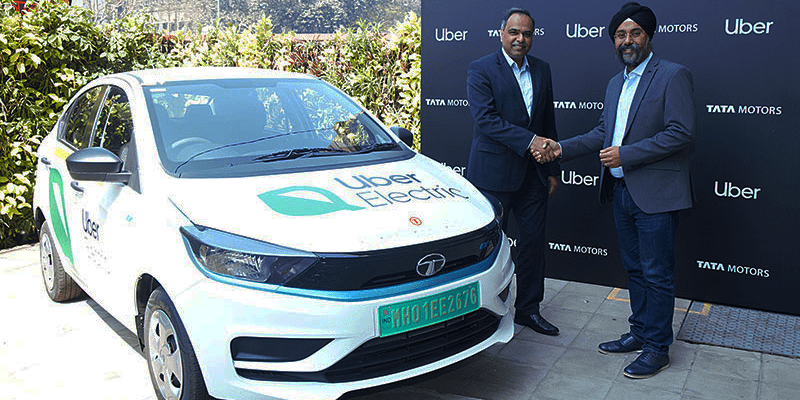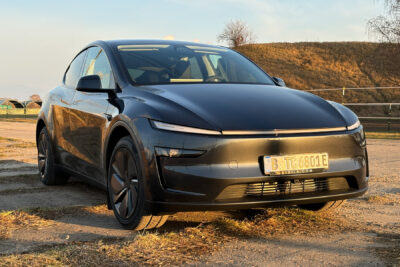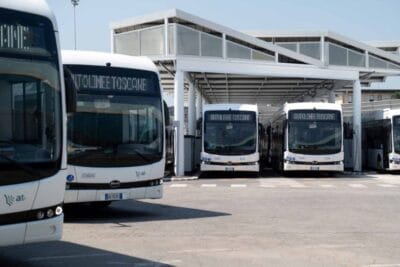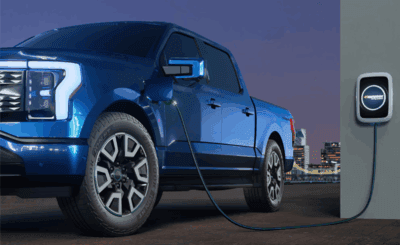Uber to start electrifying fleet in India with 25,000 Tata BEVs
Ride-hailing company Uber will introduce 25,000 electric cars in India over the next three years through its platform. A memorandum of understanding signed with Tata Motors envisages the phased delivery of 25,000 units of Tata’s Xpres-T EV electric car from this month.
The electric vehicles will be deployed in the Delhi area, Mumbai, Kolkata, Chennai, Hyderabad, Bengaluru and Ahmedabad. As is usual with agreements between Uber and vehicle manufacturers (for Europe, these include Kia and Hyundai, but also car rental company Hertz), Uber drivers are likely to receive special conditions for obtaining the Tata model. However, neither Tata Motors nor Uber explicitly mentions this. There is also no information on the value of the overall deal.
Instead, the ride-hailing company says in a statement that the agreement represents “the largest electric vehicle engagement to date between an automobile manufacturer and a ridesharing platform in India”. While it is currently only a letter of intent, the timeline with the first deliveries planned for this month suggests that the deal will be given mandatory status in the near future.
For Uber, the collaboration is a step towards realising its self-imposed commitment to ensure that all rides booked via its platform worldwide are provided by electric vehicles or micro-mobility services such as e-scooters or rental bicycles by 2040. In the USA, Canada and Europe, this goal is to be achieved as early as 2030. In London, as early as 2025.
“We are going to be a big catalyst in accelerating the (EV) ecosystem,” Prabhjeet Singh, president of Uber India and South Asia, told Reuters. In Tata’s press release, Singh is quoted as saying that it is committed to “doing our part to bring down the barriers to going electric by working with industry partners that are leading the change”.
Tata Motors has delivered just over 50,000 electric cars in its home market so far, including both private and fleet sales. With Xpres, Tata has been running a subsidiary specifically for fleet customers since July 2021, which is now becoming a household name for the first time thanks to the deal with Uber.
The electric sedan Xpres-T EV is Tata’s first vehicle under this brand. It is therefore a model specifically aimed at fleet services. According to the manufacturer, the range will be 315 or 277 kilometres. However, according to a domestic test cycle of the Automotive Research Association of India. The rather small battery, which Tata specifies with an energy content of 26 or 25.5 kWh, suggests that the range will be shorter according to WLTP. The charging time from 0 to 80 per cent SoC is given as 59 or 110 minutes. Further technical information on the vehicle itself is not included in the announcement.
On the Tata website, it is stated that the Xpres-T EV is four metres long and has a wheelbase of 2.45 metres. The peak power output is said to be 30 kW. However, the website also states that the battery energy content is 21.5 kWh. So it is quite possible that individual adjustments will be made in view of the order size for Uber.
Shailesh Chandra, Managing Director, Tata Motors Passenger Vehicles and Tata Passenger Electric Mobility hopes the collaboration with Uber will be an eMobility game changer in the country, “Offering customers our environmentally friendly EV ride experiences via Uber’s Premium Category service, will accelerate the adoption of green and clean personal ride-sharing. The XPRES-T EV is a very attractive option both for customers and operators.” He added that the partnership will further strengthen Tata’s market position in the fleet segment.
Tata has international operations in the UK, South Korea, Thailand, South Africa and Indonesia. The company cites Africa, the Middle East, South and Southeast Asia, Australia, South America, Russia and other CIS countries as its main sales markets. The group plans to launch ten electric models by March 2026 and, according to an earlier Reuters report, expects electric cars to account for a quarter of total sales by 2025.
Besides the passenger car market, Tata Motors is also active in the commercial vehicle market. Several large-scale electric bus orders have recently come to light from the Indian manufacturer via the Indian CESL promotion – such as over 2,000 electric buses from the West Bengal Transport Corporation and the Bengaluru Metropolitan Transport Corporation and over 1,500 electric buses from the Delhi Transport Corporation.
The Indian electric car market is still tiny compared to the enormous population. According to Reuters, electric models accounted for just one per cent of total car sales of around 3.8 million vehicles last year. Manufacturers active in this field or about to enter the market include the local heroes Tata Motors and Mahindra & Mahindra as well as the Chinese brands BYD and MG Motors.





1 Comment